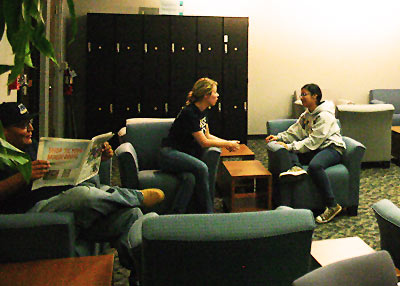For more than 1,000 transfer and commuter students on Northern Arizona University’s Flagstaff campus, just “having a place to land” can make a big difference in their college experience.
That’s the rationale behind Transfer and Commuter Connections, a new program for students who might need a little extra help assimilating.
“We haven’t had a physical locale or a program dedicated to this population,” said Jennifer Riddle, coordinator of the program. “This is seen as a way to help with retention and recruitment.”
The program provides a drop-in space on the second floor of the University Union (room 235), complete with day lockers, computer terminals and some comfortable places to sit.
“If they don’t have a dorm room or can’t run home, then we want to give them a welcoming environment where they can relax,” Riddle said.
Peer mentoring constitutes another program component, as one graduate student and 14 undergraduates—all former transfer students—offer assistance with the sorts of issues that may arise for those who are new to campus. For example, Riddle said, transfer students may have learned to navigate their previous institution but must “re-navigate” NAU’s structure and culture.
And for those who transferred from out of state, or who commute daily, forming social connections can be a challenge, so mentors collaborate with other campus departments and programs, such as Peer Jacks, to help students learn more about activities on campus.
The program also has a presence in the admissions call center, where mentors speak with potential transfer students to help them move through the admissions process and provide them with an early connection to campus.
“Transfer students are going to continue to play an important role in growing our enrollment, so it’s incumbent upon the university to supply them the resources and support to develop the connections that they need,” according to Erin Grisham, executive director of Educational Support Services, which oversees the program.
A survey of transfer students last fall indicated a desire for “increased connections to their majors, information on how to get involved on campus and better communication from the university about the transfer process.”
“I’m confident that what we’ve put together will serve the needs of these students,” Grisham said.



